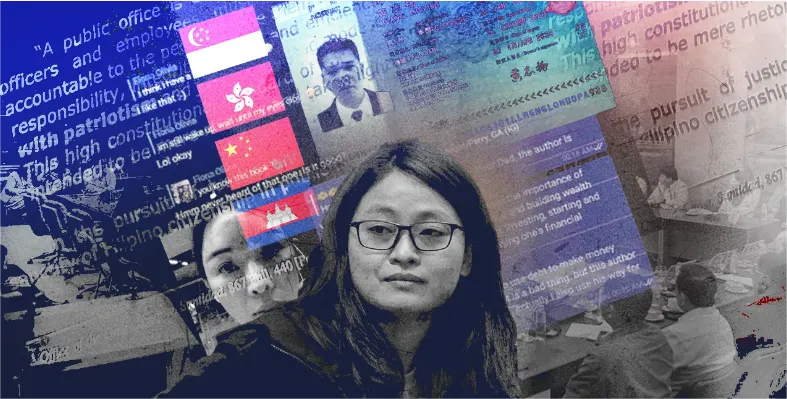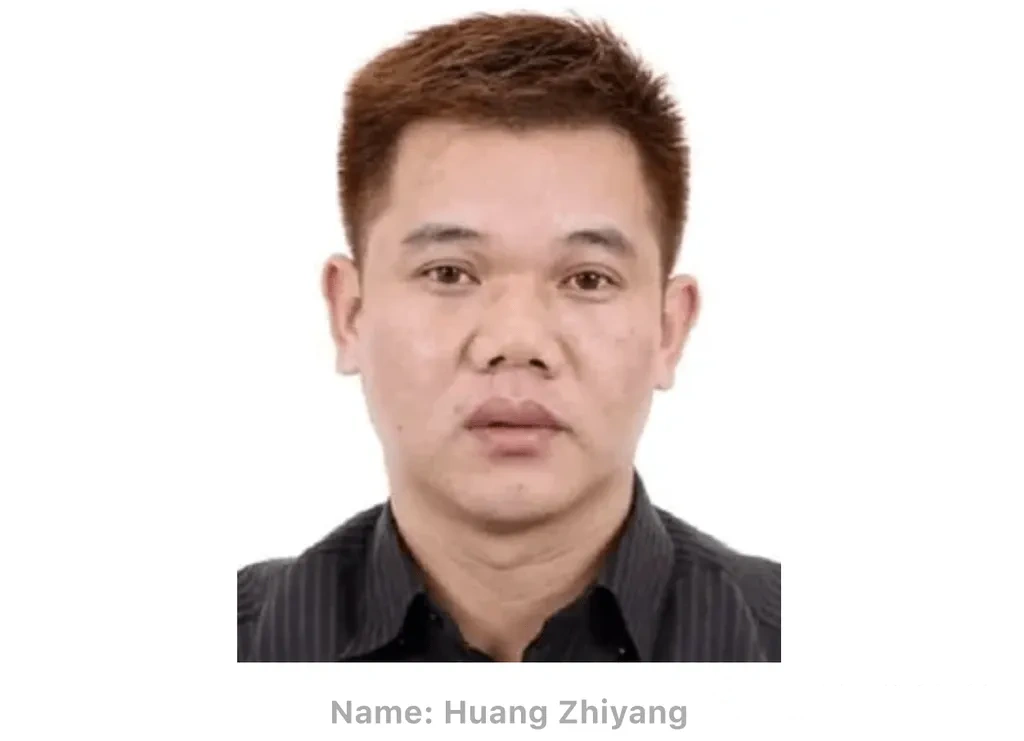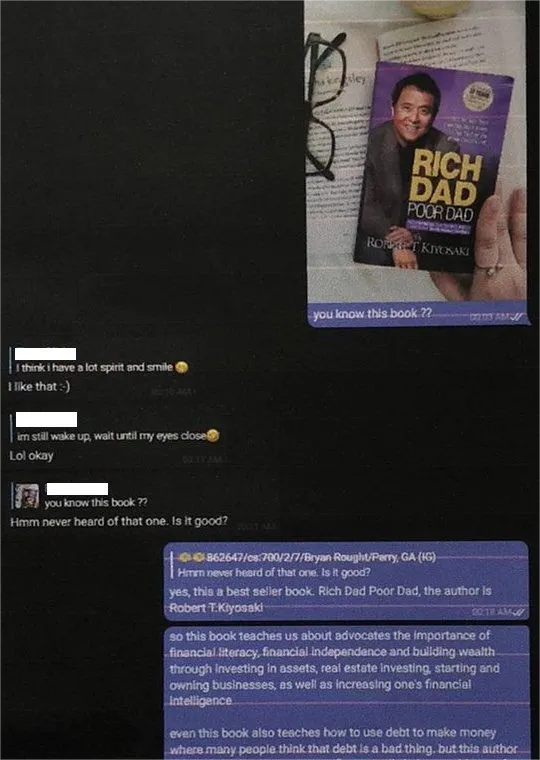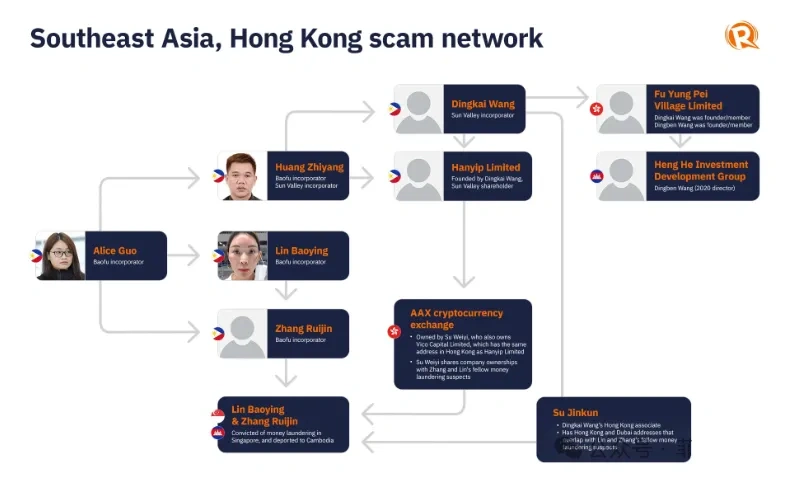Three Chinese nationals who have business dealings with Guo Huaping are linked to cryptocurrency fraud in Hong Kong, scam farms in Cambodia, and money laundering in Singapore
A Rappler investigation reveals that Guo Huaping's business partners in Banban, Tarlac province extend to a multinational scam enterprise operating in Southeast Asia and Hong Kong, with footprints across the Mediterranean, the Caribbean, and the UK—trafficking thousands of people, deceiving victims through cryptocurrency scams, and laundering money through gambling.
At least four suspects, originally Chinese citizens, have direct or indirect connections with Guo, who is the detained and dismissed mayor of Banban city, Tarlac province. Direct connections trace back to her business dealings, while indirect connections come from her business partners.
Guo Huaping's business partners Huang Zhiyang and the couple Zhang Ruijin and Lin Baoying have been listed as fugitives in a congressional investigation, and a Rappler investigation into company records revealed another name: Dingkai Wang, who is linked to Huang Zhiyang through the Sun Valley Clark Hub Corporation in Mabalacat City, Pampanga province, which was raided.
The couple holds multiple passports, have been convicted of money laundering, and Dingkai Wang, a Cambodian citizen, is linked to scam operations in Cambodia and Hong Kong. Huang Zhiyang is wanted for his involvement in high-risk financial fraud, helping Guo Huaping establish her business when the Philippines became the next assembly point for scam gangs that had been driven out of Cambodia and China. This was during the term of former President Rodrigo Duterte, who opened the Philippines to trade and business with China.
These suspects are linked to more individuals who were part of money laundering investigations in Singapore and were sanctioned targets in the UK. All these individuals are under surveillance by the United Nations transnational crime tracking agency.
This notorious network infiltrated the Philippines through the now-banned POGO (Philippine Offshore Gaming Operators) centers created during the Duterte era.
Huang Zhiyang
Huang Zhiyang, a co-founder with Guo Huaping, founded a real estate company called Baofu Land Development Incorporated, established on May 3, 2019. Baofu was the landlord of two POGOs raided in 2023 and 2024, previously with victims who escaped and filed complaints of being trafficked and tortured.
Guo Huaping's Baofu is not the only POGO enterprise Huang Zhiyang has in Central Luzon. As early as May 2018, Huang Zhiyang became the nominal shareholder of Sun Valley Clark in the Clark Freeport Zone.
Sun Valley is a cluster of commercial and residential buildings, whose residents engage in cryptocurrency scam activities involving trafficking victims. The Philippine Amusement and Gaming Corporation (Pagcor) canceled its POGO license in May 2023.
In May, Guo Huaping told the Senate that she knew Huang Zhiyang only because she supplied him with pork, which he needed for his many restaurants in Clark, Pampanga province.
On May 22, speaking to senators in Filipino, Guo Huaping said, "He opened many restaurants, and I sold him pork. Our transactions were good, he was friendly." She also said he was a good person, always bringing her gifts during his travels.
Huang Zhiyang's frequent travels are because he has operated businesses around the world. Born in Fujian province, China, Huang Zhiyang obtained his first foreign nationality in 2015 from St. Kitts and Nevis, a country in the Caribbean known as a tax haven where many criminals use investor visas to go there.
On January 25, 2019, already having businesses in the Philippines, Huang Zhiyang obtained a passport in Cyprus, whose "Golden Visa" program allowed criminals fast entry until the program was abolished in 2020.
Currently facing multiple criminal charges, Guo Huaping wants to attribute the crimes to Huang Zhiyang.
Dingkai Wang
Like Huang Zhiyang, Dingkai Wang also comes from Fujian and is a nominal shareholder of Sun Valley in Pampanga province. As far as we know, he has no direct connection with Guo Huaping, but belongs to Huang Zhiyang's network. Dingkai Wang became a Cambodian citizen in February 2017 under a royal decree.
According to our sources, Dingkai Wang used a Cambodian passport to apply for a retirement visa in the Philippines, but they could not confirm the specific date. After Sun Valley was raided in May 2023, he left the Philippines for Japan in September of the same year. According to our immigration sources, he has no criminal record here and has not returned since.
According to company records obtained from the Hong Kong registry, Dingkai Wang is linked to a large scam operation in Cambodia and has some connections with cryptocurrency fraud in Hong Kong.
It is reported that in Cambodia, the scam gangs are operated by the Heng He group. In 2023, the UK sanctioned the Heng He casino under its global human rights mechanism for "supporting and concealing evidence of activities that violate the right not to be subjected to torture or cruel, inhuman, or degrading treatment."
We found through the Hong Kong registry that Dingkai Wang has connections with the Heng He group through other companies. Dingkai is a business partner in another Hong Kong company with a director of Heng He Investment Development Limited, a subsidiary of the group, which has been confirmed through records from the Hong Kong registry and the director's Cambodian citizenship decree.
Testimonies from victims of the Mekong River in Cambodia about trafficking and forced labor are similar to the stories of over a thousand victims rescued by the Presidential Anti-Organized Crime Commission (PAOCC) from Sun Valley Clark in May 2023.
Rappler sent messages to all the email addresses listed for Sun Valley on October 1, asking if they were aware of the connections between Huang Zhiyang and Dingkai Wang with the dark network, but they have not yet responded. Rappler also sent an email to a Hong Kong company listed under the name of Sun Valley on October 3, but it has not yet responded.
Scripted Scams
How exactly do the scams in the Philippines, Cambodia, and other countries/regions operate?
Rappler learned that the staff receive a script with different roles they are supposed to play to lure victims into cryptocurrency scams. These scams are mostly conducted through dating websites, with scammers using photos of either unwitting individuals whose social media profiles are public or models hired by the center.
They can choose life stories in an Excel sheet—both their personal history and their daily activities. In Sun Valley, there are photos as mundane as a McFlurry and as stimulating as a financial knowledge book, ready to be sent to victims who might ask the scammer what they are doing at a particular moment.
Advertisements, posters, publications
Although Huang Zhiyang and Dingkai Wang are only nominal shareholders of Sun Valley, according to registration records submitted to the Philippine Securities and Exchange Commission (SEC) by two companies registered in the British Virgin Islands (another tax haven), these two companies own the majority of the shares. One of them is Hanyip Limited. According to documents submitted to the Hong Kong Companies Registry, Dingkai Wang established a company in Hong Kong under the same name.
Hanyip Limited raised suspicions because its address in the Hong Kong registry is the same as that of Vico Capital Limited, whose boss is the owner of a bankrupt cryptocurrency trading platform in Hong Kong. Dingkai Wang of the Heng He group also registered a company at this address. According to local news HK01 in 2022, the trading platform was also involved in defrauding thousands of people.
For reasons not yet explained, Huang Zhiyang, Dingkai Wang, and any initiators of Sun Valley have not been included in the indictment for trafficking, cybercrime, and illegal detention filed by the Department of Justice in May 2023. In the lawsuit filed against the POGO in Porac, Pampanga province, all initiators were charged, on the grounds that they were all part of the criminal system.
Rappler asked the Department of Justice (DOJ) again on October 3, October 7, and October 14 why these initiators were not prosecuted, but the different officials we asked have not yet responded. Once they respond, we will update this report.
According to the government company that manages the Clark Economic Zone, the licenses of the POGOs raided inside the center have been confiscated, and the buildings inside the complex have been sealed.
Guo Huaping and the Singapore Money Laundering Case
Guo Huaping said that after buying several hectares of land in Banban, she offered an investment opportunity to her client Huang Zhiyang. The proposal was realized in the form of Baofu. Huang Zhiyang invested 175,000 pesos with his newly acquired Cypriot passport, giving him a 14% share, while Guo Huaping owned 50%. The detained Filipino, Rachelle Carreon, owned 10%.
The remaining 26% was split between Huang Zhiyang's confidants Zhang Ruijin and his girlfriend Lin Baoying. The two were eventually convicted of money laundering in Singapore through luxury residences and others.
Guo Huaping said it was Huang Zhiyang who introduced Zhang and Lin. "At that time, I talked to Huang Zhiyang, and my thought was that since I own the land, I own the majority of the shares, I won't lose anything," Guo told the Senate in May.
According to documents from the Philippine Securities and Exchange Commission, Huang, Zhang, and Lin all lived in Fontana, Clark, Pampanga province, when Baofu was established.
After settling in the Philippines, the couple Lin and Zhang established another company in London in January 2019, called Jinying Invest Company Limited. According to documents they submitted to the UK Business and Trade Department, they listed the Philippines as their address.
According to a recent report by the United Nations Office on Drugs and Crime (UNODC), the trial in Singapore revealed how Lin and Zhang's network "earned millions of dollars through online gambling platforms located in several under-regulated offshore jurisdictions," including the Philippines.
The first POGO raided by Baofu was Hongsheng Game Technology Company, which was cracked by the Criminal Investigation and Detection Group in February 2023. Around the same time, the couple Lin and Zhang settled in a luxury residential area in Sentosa Bay, Singapore, where they were convicted of laundering the black money they earned from their POGO business in the Philippines.
According to The Straits Times, the two were also arrested in Sentosa in August 2023, which Singaporean authorities called the country's largest money laundering case. In this scheme, funds from illegal overseas sources were hidden through banks, mansions, luxury cars, jewelry, and designer bags.
The United Nations Office on Drugs and Crime said: "While the full amount and exact source of their wealth are not yet clear, the charges are mainly focused on money laundering, which is obtained through illegal online gambling activities, especially in the Philippines."
Law Net Out of Reach
Also in August 2023, local police in China issued a warrant for Huang Zhiyang. The Zibo police said that Huang Zhiyang was one of 15 suspects of transnational online gambling crimes found to be "illegally staying abroad."
Although the couple Zhang Ruijin and Lin Baoying were convicted of money laundering in Singapore, they were only sentenced to 15 months in prison. According to Singapore's Business Times, they were deported back to Cambodia in June 2024.
They, along with Huang Zhiyang, are wanted in the Philippines for crimes related to the POGO business inside Baofu. The three have not been found, and Guo is detained on non-bailable human trafficking charges.
The Philippine network has other connections with Singapore. One is through Wang Baosen, the third convicted person in the Singapore money laundering case.
The report by the Office on Drugs and Crime states: "According to court documents, Wang Baosen also admitted to working at Hongli International in the Clark Freeport Zone of Pampanga and later moved to Bavet City, Cambodia."
Another connection is through Dingkai Wang's business partner in a Hong Kong company, including Su Jinkun, who listed multiple residential and communication addresses in Dubai, Hong Kong, and China, overlapping with the money laundering suspects Zhang and Lin. Another business partner of Dingkai Wang, Su Weiyi, co-owner of a Hong Kong cryptocurrency exchange, also shares company ownership with members of the Singapore money laundering gang (see figure).
Through the Open Door
The Philippines is an attractive destination for scam gangs fleeing crackdowns in China and Cambodia. When PAOCC raided the POGO Zun Yuan in Banban City in March 2024, it found that among the 201 Chinese citizens working there, 6 were Chinese fugitives.
They were able to obtain Philippine visas because, according to the immigration bureau, the Philippines was unaware of their criminal records during the application process.
"Usually, these fugitives are listed as wanted by their countries after obtaining visas and/or entering the country. In many cases, their governments only notify the immigration bureau of their cases after they enter the Philippines or are arrested in the Philippines," immigration bureau spokesperson Dana Sandoval told Rappler.
Sandoval said the Philippines is currently asking foreign governments to share data more effectively.
"Is this latest influx part of a long-term trend (of Chinese expatriates), or is there another reason? "It is possible that Chinese criminals have already moved to our country, finding a haven here," National Intelligence Coordination Agency Director Ashley Acedillo told the Senate on October 8.
The Office on Drugs and Crime said in a report in January 2024 that casino groups "infiltrate" countries like the Philippines because we "do not have an effective, enforceable casino regulatory management and supervision system."
This is a euphemistic way of saying our system is very corrupt. Congress has suggested a series of amendments to existing laws, covering corporations, drug policies, and cyber operations, driven by clues showing the POGO network's connection with illegal drug trade.
"The online gaming companies were established with money from illegal drugs. The same money was also used to bribe government personnel and officials. They protect these foreigners... We have been exploited," said Congressman Ace Barbers, chairman of the House Committee of Four.














